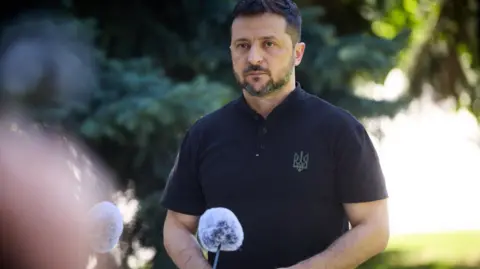Ukrainian President Volodymyr Zelensky has rejected proposals for a buffer zone between Ukrainian and Russian forces as part of a peace deal, arguing it does not reflect the realities of modern warfare.
Only those who do not understand the technological state of today's war propose a buffer zone, he told reporters on Friday.
His comments followed a report suggesting European leaders were considering a 40km (25-mile) buffer zone as part of either a ceasefire or longer-term agreement.
The war in Ukraine has evolved into a conflict driven by drone technology, and Zelensky suggested a buffer zone of sorts already existed due to the threat of drone strikes close to the front line.
Buffer zones can create demilitarized zones between warring countries, such as North and South Korea, and physical boundaries such as the Iron Curtain - which separated the Soviet Union and the West following World War Two.
According to a report in Politico, European diplomats proposed a strip of land in Ukraine to be blocked off between the two forces.
But Zelensky said there was already an area on either side of the front line where heavy artillery was unable to operate because of the risk of drone fire.
Today, our heavy weapons are located at a distance of more than 10km from each other because everything is hit by drones, he said.
This buffer - I call it a 'dead zone', some call it a 'grey zone' - already exists.
He added that any such deal could also mean Ukraine surrendering territory within the zone, which he also rejected: If Russia wants to have a greater distance from us, they can retreat deep into the temporarily occupied territories of Ukraine.
Zelensky also commented on the current state of negotiations, indicating that Russia was not prepared for diplomacy but was instead trying to prolong the conflict.
A US-led diplomatic effort to end Russia's ongoing war appears to be losing momentum. A meeting between US President Donald Trump, Zelensky, and European leaders raised hopes for a potential summit between Zelensky and Russian President Vladimir Putin, but expectations have dimmed.
Russia's continued military actions, including a recent aerial assault that killed 23 people in Kyiv, further complicate the prospects for peace talks.
European leaders, including French President Emmanuel Macron and German Chancellor Friedrich Merz, indicated they would continue to pressure Russia amid concerns that Putin is unwilling to negotiate.
While ongoing discussions emphasize the need for security guarantees for Ukraine, Zelensky expressed hope for 'Nato-like' commitments from allies to bolster Ukraine's defense amidst the continuing threat from Russia.
Meanwhile, Russian officials criticized Western proposals, insisting that any security guarantees must consider Russia's security interests as well.
}


















